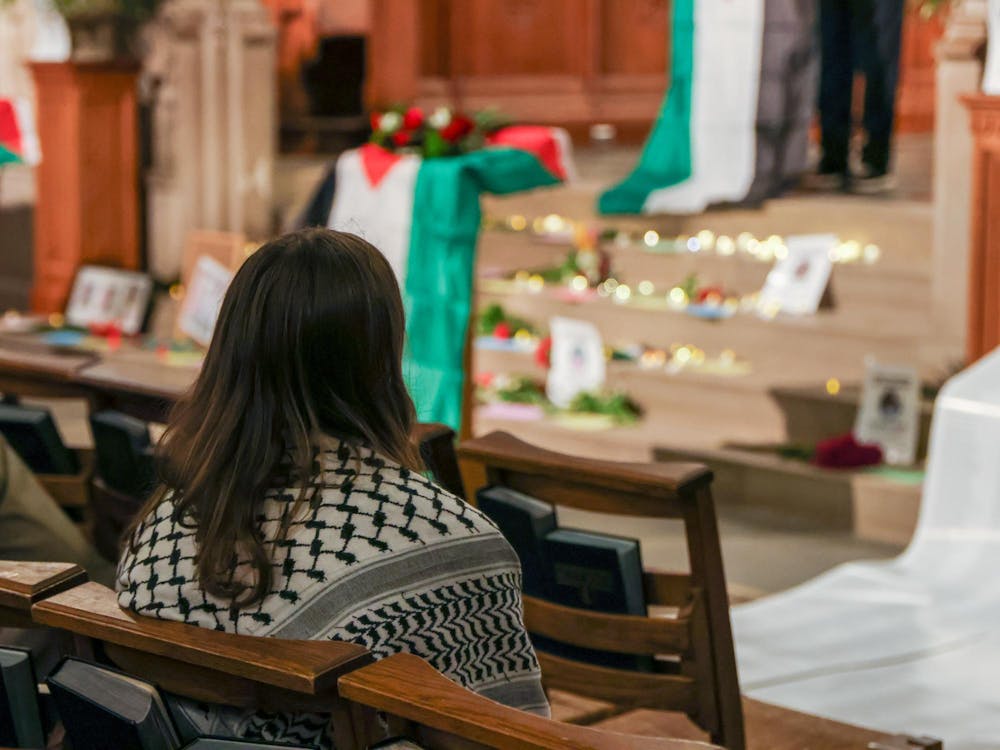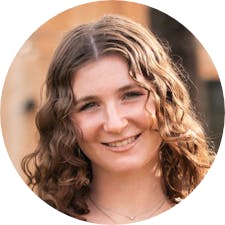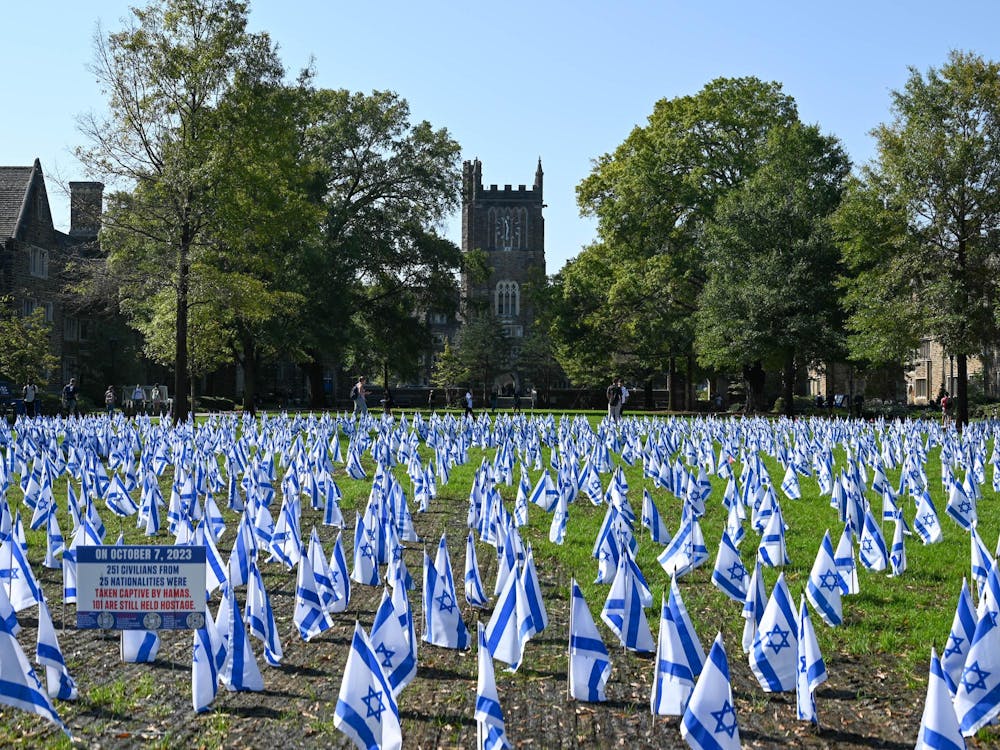Pro-Israel and pro-Palestinian student groups held memorials on campus Monday, exactly one year after the Oct. 7, 2023, attack on southern Israel by militant group Hamas.
By the early morning, the portion of Abele Quad between the Brodhead Center and Few dorm was adorned with 1,871 flags, representing both the Israeli citizens and hostages from 25 other countries. On the perimeter of the display, signs referenced the deaths of over 700 Israeli Defense Force soldiers in combat against “Iranian terror proxies” since Oct. 7, as well as 251 civilians who were “taken captive by Hamas” and 1,200 people from 35 countries who were “murdered by Hamas” on the day of the attacks.
The signs included references to student group Duke Students Supporting Israel, international civil rights movement End Jew Hatred and Passages, a Christian organization that organizes student trips to Israel.
Memorial hosted by Jewish community
“A year ago today, Hamas ruthlessly murdered 1,139 Israelis and foreign nationals, captured 251 hostages, … savagely wounded over 5,000 and displaced thousands from their homes. Hamas unleashed a year of horror, causing more innocent Israeli and Palestinian deaths since,” said Joyce Gordon, director for Jewish Life. “... Every day is Oct. 7 for them.”
Over 350 members of the Duke community gathered in Penn Pavilion Monday afternoon for a memorial marking one-year since the Oct. 7 Hamas terrorist attack on Israel. The event was co-sponsored by Jewish Life at Duke, the Duke Center for Jewish Studies, Chabad at Duke, the Jewish Business Association, the Jewish Law Students Association, the Jewish Medical Students Association, the Jewish Student Union, Duke Friends of Israel, J Street U Duke, Duke Students Supporting Israel and the Duke Israel Public Affairs Committee.
Senior Alexandra Ahdoot, co-president of Duke SSI, shared that having the memorial with “people of different backgrounds coming together” to stand in unity and solidarity “speaks volumes to the resilience of Israel and the Jewish people at large.”
Gordon recognized the diverse coalition of the Jewish community that came together to recognize the “somber anniversary” of Oct. 7 and acknowledged the “tapestry of grief” experienced over the past year.
“Grief looks like the open vulnerability and resolve of Rachel Goldberg, mother of 23-year-old Hersh Goldberg-Polin, who was wounded, taken hostage by Hamas for 11 months and then cruelly murdered,” Gordon said. Goldberg-Polin — an American-Israeli citizen — was kidnapped from the Nova music festival and held hostage in Gaza for 329 days until he was killed hours before a planned rescue mission.
Ahdoot and Jordyn Sandler, senior and co-president of Duke Israel Public Affairs Committee, then read the letter of IDF Sgt. Maj. Ben Zussman, a 22-year-old from Jerusalem who died in combat in Gaza in December.
Ahdoot noted the letter embodied the “Israeli resilience” and “spirit” of the Jewish people. The two then led the attendees in Mi Shebeirach, the Jewish prayer for healing.
Marc Zvi Brettler, Bernice and Morton Lerner distinguished professor in Judaic studies, delivered a speech, during which he teared up while recounting his observations from the past year.
“What I find most encouraging about today's gathering is not the number of you who are here — though that too is offering me some solace — but the diversity of people, especially from such disparate Jewish organizations,” he said, emphasizing the importance of a united Jewish community.
Sagi Gabay, an Israeli who survived the Nova Music Festival attack, recounted how he felt like “[a] refugee in [his] own country,” upon being rescued from Hamas amid the attack.
He and his then-girlfriend initially tried to escape by car but then ended up in a shelter with 30 to 40 other people, leaving only 4 minutes before Hamas raided it, killed and took hostage those remaining, including Goldberg-Polin.
“Oct. 7 was a big lesson for all of us, and we must be smart enough to understand it. We must be united inside Israel and outside Israel,” Gabay said. “We don't have the privilege to be divided, and we don't have the privilege for Jewish wars.”
Elana Friedman, campus rabbi and Jewish chaplain, concluded the ceremony by reminding the attendees to be “gentle” to themselves as they “traverse these days together and these moments of suffering together.”
The attendees then recited the Mourner’s Kaddish and sang Oseh Shalom, a prayer for peace. Students put their arms around each other and sang the Hatikvah, the Israeli national anthem.
Vigil hosted by pro-Palestinian groups
Duke community members held a vigil in the Chapel Monday evening to mourn for the Palestinian lives lost since Oct. 7.
Get The Chronicle straight to your inbox
Sign up for our weekly newsletter. Cancel at any time.
Before students began gathering for the vigil at 6 p.m., the organizers lined up candles on the altar steps, displayed lists of names of Palestinian victims and draped Chapel podiums with Palestinian flags.

Titled “Vigil for Palestine: One Year of Genocide,” the event was organized by Duke Students for Justice in Palestine and co-sponsored by Duke Divest Coalition, Voices for Justice in Palestine, Duke Muslim Students Association, Duke Academics and Staff for Justice in Palestine, the Triangle chapter of Jewish Voice for Peace, the University of North Carolina at Charlotte chapter of SJP and Judaism on Our Own Terms Duke University Chapter.
Not all speakers identified themselves by their full names.
The vigil opened with a moment of silence in remembrance of the Palestinians killed in the war. The first speaker of the night, introduced as Rabbi Noah, began by mourning the death of “41,900, with many more trapped under the rubble in Gaza.”
“Every life lost in Gaza is a whole world, and each of us also together, our movements are a miracle, and [it] is a miracle that we keep going and keep dreaming,” Rabbi Noah said.
Rabbi Noah then recited El Malei Rachamim, the Jewish prayer for the soul of the departed.
The next speaker, introduced as Pastor Mark, then spoke about the power of hope as the “greatest gifts of community.”
He emphasized the need to “sustain ourselves in this struggle” and “stay strongly connected to our sources of hope.” He also highlighted the connection among the spiritual traditions of Christianity, Judaism and Islam in their shared belief that the “light” resides in everyone.
Pastor Mark made reference to Martin Luther King Jr.’s quote about the moral arc of the universe bending toward justice.
“Unlikely as it seems today, I believe we are seeing the bending of the arc,” he said.
He also emphasized that the “viable path” to “lasting peace, security and dignity” is by turning away from “the hawks and the war profiteers” and instead listening to Israeli and Palestinian peacemakers. He called for an immediate cease-fire, the end of the Israeli occupation of Palestinian territories and the cessation of U.S. military aid to Israel.
The next speaker, Imam Abdul Waheed, described the sacredness of human life in Islam and invited the attendees to mourn for the loss of lives of innocent children.
“We want freedom, justice and equality for the Palestinian people. They deserve the dignity that every human soul has,” he said. “When a child comes into this world and lives in this world, they have the right to have freedom [and] to have the dignity in the honor of every other human soul despite their race, despite their religion [and] despite their ethnicity.”
Emily Rogers, assistant professor of cultural anthropology, delivered the closing speech. She spoke about the “attacks on freedom of speech on college campuses” and how the one-year mark serves as an opportunity to “take stock of and recommit to our activism” to “show universities that words are not enough.”
The speeches were punctuated by two poetry recitations delivered by students.
Maya, a Duke student, reflected on the legacies of the Palestinians who lost their lives by reciting the poem “I Grant You Refuge” by Hiba Abu Nada, a Palestinian poet, novelist and teacher who was killed along with her son in an Oct. 20 Israeli air strike. Abu Nada’s poem was written ten days before her death.
Toward the end of the vigil, one of the organizers read out the names of several Palestinians who were killed in the war, one for each age from zero to 100. The speaker reminded the attendees to “resist the dehumanization that often comes along with these names.”
“They are not ink on a screen. They are not numbers on our phones,” said one of the organizers. “They are daughters, siblings, children, mothers, fathers — each of them with their own life taken away brutally in the genocide.”

Ava Littman is a Trinity sophomore and an associate news editor for the news department.
Lucas Lin is a Trinity sophomore and a university news editor of The Chronicle's 120th volume.

